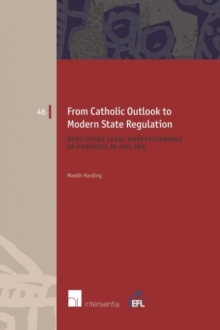
Same-Sex Relationships and Beyond (3rd edition) : Gender Matters in the EU Paperback / softback
Edited by Katharina Boele-Woelki, Angelika Fuchs
Part of the European Family Law series
Paperback / softback
Description
The legal status of lesbian, gay, bisexual and transgender (LGBT) people has undergone significant changes in several countries, but remains highly complex and difficult for those affected.
Although same-sex partners may have the right to marry or enter into a registered partnership in one Member State, this legal relationship may not be recognised when they exercise their right to freedom of movement.
The same is true for certain parent-child relationships, which may be recognised as such in one Member State but not another.This book explores the challenges and controversies concerning the recognition of same-sex relationships throughout the EU through the lens of EU legislation, the case law of the CJEU and ECtHR, and recent national developments.
Following the Irish referendum and the recent ECtHR judgment in Oliari v Italy, more changes are expected in the near future.The opening part of the book describes the current state of play in all EU Member States (and beyond) when formalising a same-sex relationship, 'steady progress' being the key term in describing the developments in many countries (with the exception of six Eastern European states that object to legislation in this field).
The second part concentrates on parenthood and children's rights, notably adoption, surrogacy, multiple parenting and the range of parenting rights for same-sex couples, transsexual and transgender people.
The third part on gender identity and human rights discusses the legal aftermath of the European Court of Human Rights' judgment in Oliari, condemning Italy for failing to protect homosexuals' right to family life.
Furthermore, it explains EU legislation against discrimination on grounds of sexual orientation and the challenges lesbian, gay, bisexual and transgender applicants are confronted with when reaching Europe as refugees.
The book ends with a lively debate on the right to change one's legal sex and raises the fundamental question whether we still need sex as a legal category.
Information
-
Out of Stock - We are unable to provide an estimated availability date for this product
- Format:Paperback / softback
- Pages:250 pages
- Publisher:Intersentia Ltd
- Publication Date:31/03/2017
- Category:
- ISBN:9781780684475
Information
-
Out of Stock - We are unable to provide an estimated availability date for this product
- Format:Paperback / softback
- Pages:250 pages
- Publisher:Intersentia Ltd
- Publication Date:31/03/2017
- Category:
- ISBN:9781780684475










